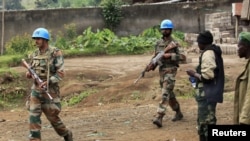KINSHASA, DRC - The U.N. military mission in the Democratic Republic of Congo says it will use all the means at its disposal to protect the eastern city of Goma and its half-million inhabitants from possible attack by rebels. The rebels of the M23 movement were about 70 kilometers north of Goma Monday after pushing back government forces at the weekend.
The U.N. mission, MONUSCO, confirms that the M23 rebels took control of the town of Rutshuru at the weekend, on the main road to Goma. Monday, the U.N. said the town and surrounding areas were quiet with no reports of fighting.
MONUSCO spokesman Mounoubai Manodje said MONUSCO stands ready to defend Goma, the capital of North Kivu province.
"Goma is a city with a lot of people, so if there's going to be a fight within the city of Goma, it's expected there might be a lot of injuries among civilians and a lot of displacement of civilians," said Manodje. "On the basis of our mandate, We will take the necessary measures to protect Goma. It's not a matter of working alongside the FARDC, it's a matter of implementing our mandate."
The FARDC is the Congolese government army. A U.N. peacekeeper, from India, was killed during fighting in North Kivu last week. Manodje said the peacekeeper died in an explosion and had not been directly targeted by either side.
The U.N. spokesman also confirmed that MONUSCO helicopters flew missions against the M23 at the weekend.
"Our helicopters engaged the M23 as part of our operation engagement to protect civilians," he said. "When from the air you see the people start to run and you see behind them a military group, you have to intervene to protect them."
The U.N. has not confirmed casualty figures from the recent fighting. Asked if the U.N. had observed cross-border military movements from Rwanda in support of the M23, Manodje said the U.N. was receiving reports and was still examining them to see if they were true.
Last month, a U.N. Group of Experts on the Congo presented detailed evidence to the U.N. Security Council suggesting that senior Rwandan military officials have been organizing supplies, helping with recruitment and sending regular army reinforcements for the M23 from Rwanda. The Rwandan government has denied the reports.
The Congolese army reportedly fell back from Rutshuru without a fight on Saturday, but the U.N. says the army put up a fierce fight for the border town of Bunagana last week.
Rebel commander Colonel Sultani Makenga told media on Sunday that the M23 was ready to negotiate with the government.
The current situation in North Kivu is similar to what it was in 2008-2009, when another rebel movement, the CNDP, consisting of many of the same people now in the M23, several times routed the government army and threatened to take Goma.
U.N. peacekeepers were deployed in strength to defend Goma at that time and a peace agreement was reached between the government and the CNDP. The M23 takes its name from that agreement, which was signed on March 23, and which it asserts the government has broken.
The U.N. mission, MONUSCO, confirms that the M23 rebels took control of the town of Rutshuru at the weekend, on the main road to Goma. Monday, the U.N. said the town and surrounding areas were quiet with no reports of fighting.
MONUSCO spokesman Mounoubai Manodje said MONUSCO stands ready to defend Goma, the capital of North Kivu province.
"Goma is a city with a lot of people, so if there's going to be a fight within the city of Goma, it's expected there might be a lot of injuries among civilians and a lot of displacement of civilians," said Manodje. "On the basis of our mandate, We will take the necessary measures to protect Goma. It's not a matter of working alongside the FARDC, it's a matter of implementing our mandate."
The FARDC is the Congolese government army. A U.N. peacekeeper, from India, was killed during fighting in North Kivu last week. Manodje said the peacekeeper died in an explosion and had not been directly targeted by either side.
The U.N. spokesman also confirmed that MONUSCO helicopters flew missions against the M23 at the weekend.
"Our helicopters engaged the M23 as part of our operation engagement to protect civilians," he said. "When from the air you see the people start to run and you see behind them a military group, you have to intervene to protect them."
The U.N. has not confirmed casualty figures from the recent fighting. Asked if the U.N. had observed cross-border military movements from Rwanda in support of the M23, Manodje said the U.N. was receiving reports and was still examining them to see if they were true.
Last month, a U.N. Group of Experts on the Congo presented detailed evidence to the U.N. Security Council suggesting that senior Rwandan military officials have been organizing supplies, helping with recruitment and sending regular army reinforcements for the M23 from Rwanda. The Rwandan government has denied the reports.
The Congolese army reportedly fell back from Rutshuru without a fight on Saturday, but the U.N. says the army put up a fierce fight for the border town of Bunagana last week.
Rebel commander Colonel Sultani Makenga told media on Sunday that the M23 was ready to negotiate with the government.
The current situation in North Kivu is similar to what it was in 2008-2009, when another rebel movement, the CNDP, consisting of many of the same people now in the M23, several times routed the government army and threatened to take Goma.
U.N. peacekeepers were deployed in strength to defend Goma at that time and a peace agreement was reached between the government and the CNDP. The M23 takes its name from that agreement, which was signed on March 23, and which it asserts the government has broken.




